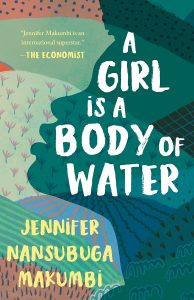 A Girl is a Body of Water by Jennifer Nansubuga Makumbi is essentially a coming-of-age story set in Uganda in the 1970s. The story begins with Kirabo Nnamiiro, a smart, feisty, twelve-year-old girl who consults a blind elderly neighbor, Nsuuta-labeled by the village as a witch-, to help search for her mother and also to help her to deal with the conflicting emotions wracking her teenage body that make her “feel squeezed inside this body as if there is no space.” The relationship Kirabo develops with Nsuuta is complicated by the contentious relationship between Nsuuta and Kirabo’s grandmother, Muka Miiro, an intriguing relationship which becomes the centerpiece of the story at one point.
A Girl is a Body of Water by Jennifer Nansubuga Makumbi is essentially a coming-of-age story set in Uganda in the 1970s. The story begins with Kirabo Nnamiiro, a smart, feisty, twelve-year-old girl who consults a blind elderly neighbor, Nsuuta-labeled by the village as a witch-, to help search for her mother and also to help her to deal with the conflicting emotions wracking her teenage body that make her “feel squeezed inside this body as if there is no space.” The relationship Kirabo develops with Nsuuta is complicated by the contentious relationship between Nsuuta and Kirabo’s grandmother, Muka Miiro, an intriguing relationship which becomes the centerpiece of the story at one point.
The book is simple in structure yet filled with such beautiful detail, colorful depictions, and complex relationships that–once you get into it–it is impossible to stop reading until you know how where the journey ends. It got off to a slow start. For example, in the beginning we meet a chorus of cousins, most of whom do not feature in the rest of the book. And in early meetings between Kirabo and Nsuuta, their exchange is so filled with undertones of an unspoken history that readers may find it hard to get immersed in their discussions.
That said, readers who persevere will be well rewarded. As the book continues, we journey with Kirabo through many changes. She leaves her rural home where her grandfather, Miiro, commands great respect as a wealthy farmer and moves to the city where she sees her relative wealth in a different light and “her dress, which she had thought so pretty, now [feels] drab.” As the book progresses, Kirabo learns her family secrets, falls in love, goes to a prestigious all-girls boarding school, and endures great emotional pain and betrayal until we leave her at nineteen matured, assertive, and about to embark on a significant new journey.
Kirabo has a large close-knit extended family, and so A Girl is a Body of Water includes a large cast of characters that is sometimes difficult to follow. There were a couple of characters who were drawn in a harshly negative light and given no real opportunity for redemption, but the main cast is truly appealing, realistic, and nuanced and most readers will relate to Kirabo’s adventurous spirit, the fun and rebellious aunt Abi, and the gentle interior under Grandmother’s sternness, and more.
In addition to being a coming of age story, A Girl is a Body of Water takes a serious look at a number of issues which were front and center for women in the 1970s and remain so today. Women’s rights and the feminist movement (mwenkanonkano) are a central theme as Kirabo questions her place in the world and the contrast between the opportunities afforded to and the expectations placed on her and those available to her male counterparts. Nsuuta shows her the power of story-telling to build community but also to change a narrative to suit the story-teller’s purpose and often to redefine women’s position in the world, making them “rootless.” They discuss ideas such as the way that “women are brought up to treat sex as sacred while men treat it as a snack” and how since “Boys and men were [portrayed as] wolves…it fell on girls not to awaken the animal in men.” In the early sections of the book when Kirabo is twelve, it seems unrealistic that she truly understands some of these concepts and the discussions come across as Makumbi trying to make a point, however, overall, the ideas are woven tightly into the narrative and do not stand out as being preachy. In addition, the book attempts a balanced look at the treatment of women and includes a number of men who make a conscious effort to treat women respectively and as equals, although Kirabo realizes that even these men view some women worthy of respect and others, disposable.
The book is set during Idi Amin’s presidency and as a result, the scourge of unrest, war, and clan rivalry touches the character’s lives. Makumbi avoids making this a political commentary, only including the impact of the war as much as it disrupts the family’s life. At the forefront are the relationships among the characters, fierce loyalties, tight friendships, blind love, and betrayal. The story also touches on the complexities of inheritance in a country where maintaining land ownership within a family is paramount.
The story is deeply steeped in Ugandan landscape, culture, lifestyle, and language. The narrative and the dialog are both written with nuances of – what I assume is – Ugandan speech, and this is as it should be. While certain turns of phrase or customs may seem unusual to Western readers, this is an added bonus for those readers-exposure to something new; a learning opportunity encapsulated in an engaging novel.
A Girl is a Body of Water takes an unbiased and unapologetic look at gender-, class-, religion-, and color-related challenges of growing up as a young woman in 1970 in Uganda in a way that will resonate with many readers and make us question how much we have really evolved.
This review is of what may be a pre-final-edited-version of this book provided to me via Net Galley. The book will be published September 1, 2020.
